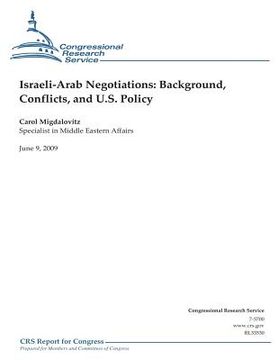Israeli-Arab Negotiations: Background, Conflicts, and U.S. Policy (en Inglés)
Reseña del libro "Israeli-Arab Negotiations: Background, Conflicts, and U.S. Policy (en Inglés)"
After the first Gulf war, in 1991, a new peace process consisting of bilateral negotiations between Israel and the Palestinians, Jordan, Syria, and Lebanon achieved mixed results. Milestones included the Israeli-Palestine Liberation Organization (PLO) Declaration of Principles (DOP) of September 13, 1993, providing for Palestinian empowerment and some territorial control, the Israeli-Jordanian peace treaty of October 26, 1994, and the Interim Self-Rule in the West Bank or Oslo II accord of September 28, 1995, which led to the formation of the Palestinian Authority (PA) to govern the West Bank and Gaza Strip. However, Israeli-Syrian negotiations were intermittent and difficult, and postponed indefinitely in 2000. Israeli-Lebanese negotiations also were unsuccessful, leading Israel to withdraw unilaterally from south Lebanon on May 24, 2000. President Clinton held a summit with Israeli and Palestinian leaders at Camp David on final status issues that July, but they did not produce an accord. A Palestinian uprising or intifadah began in September. On February 6, 2001, Ariel Sharon was elected Prime Minister of Israel, and rejected steps taken at Camp David and afterwards. On April 30, 2003, the United States, the U.N., European Union, and Russia (known as the "Quartet") presented a "Road Map" to Palestinian statehood. It has not been implemented. Israel unilaterally disengaged (withdrew) from the Gaza Strip and four small settlements in the West Bank in August 2005. On January 9, 2005, Mahmud Abbas had become President of the PA. The victory of Hamas, which Israel and the United States consider a terrorist group, in the January 2006 Palestinian parliamentary elections complicated prospects for peace as the United States, Israel, and the Quartet would not deal with a Hamas-led government until it disavowed violence, recognized Israel, and accepted prior Israeli-Palestinian accords. President Abbas's dissolution of the Hamas-led government in response to the June 2007 Hamas forcible takeover of the Gaza Strip led to resumed international contacts with the PA. On November 27, at an international conference in Annapolis, MD, President Bush read a Joint Understanding in which Abbas and Israeli Prime Minister Ehud Olmert agreed to simultaneously resume bilateral negotiations on core issues and implement the Road Map. On May 21, 2008, Israel, Syria, and Turkey announced that Syria and Israel had begun indirect peace talks in Istanbul via Turkish mediators. Later in the year, Israeli and U.S. elections appeared to disrupt negotiations on all tracks and the end of the Israeli-Hamas cease-fire in December and the subsequent outbreak of violence in Gaza led to the official suspension of peace talks. President Obama has affirmed U.S. support for a two-state solution to the Israeli-Palestinian conflict and named former Senator George Mitchell as his Special Envoy for Middle East Peace. Congress is interested in issues related to Middle East peace because of its oversight role in the conduct of U.S. foreign policy, its support for Israel, and keen constituent interest. It is especially concerned about U.S. financial and other commitments to the parties, and the 111th Congress is engaged in these matters. Congress also has endorsed Jerusalem as the undivided capital of Israel, although U.S. Administrations have consistently maintained that the fate of the city is the subject of final status negotiations.

